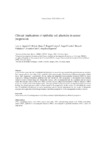Clinical implications of epithelial cell plasticity in cancer progression

Ver/
Use este enlace para citar
http://hdl.handle.net/2183/21580
A non ser que se indique outra cousa, a licenza do ítem descríbese como Atribución-NoComercial-SinDerivadas 3.0 España
Coleccións
- GI-FENM - Artigos [116]
- INIBIC-OCT - Artigos [21]
Metadatos
Mostrar o rexistro completo do ítemTítulo
Clinical implications of epithelial cell plasticity in cancer progressionAutor(es)
Data
2015Cita bibliográfica
A. Aparicio L, Blanco M, Castosa R, et al. Clinical implications of epithelial cell plasticity in cancer progression. Cancer Lett. 2015; 366(1): 1-10
Resumo
[Abstract] In the last few years, the role of epithelial cell plasticity in cancer biology research has gained increasing attention. This concept refers to the ability of the epithelial cells to dynamically switch between different phenotypic cellular states. This programme is particularly relevant during the epithelial-to-mesenchymal transition (EMT) in cancer progression. During colonization, epithelial cells first activate the EMT programme to disseminate from a primary tumour to reach a distant tissue site. During this process, cells are transported into the circulation and are able to escape the immune system of the host. Then, a reverse process called mesenchymal-to-epithelial transition (MET) occurs on cells that settle in the distant organs. Although epithelial cell plasticity has an important impact on tumour biology, the clinical relevance of this concept remains to be recapitulated. In this review, we will update the current state of epithelial cell plasticity in cancer progression and its clinical implications for the design of therapeutic strategies, the acquisition of multidrug resistance, and future perspectives for the management of cancer patients.
Palabras chave
Cancer stem cells
Circulating tumor cells
Drug resistance
Epithelial plasticity
Medical perspective
Circulating tumor cells
Drug resistance
Epithelial plasticity
Medical perspective
Descrición
Mini-review
Versión do editor
Dereitos
Atribución-NoComercial-SinDerivadas 3.0 España
ISSN
0304-3835






